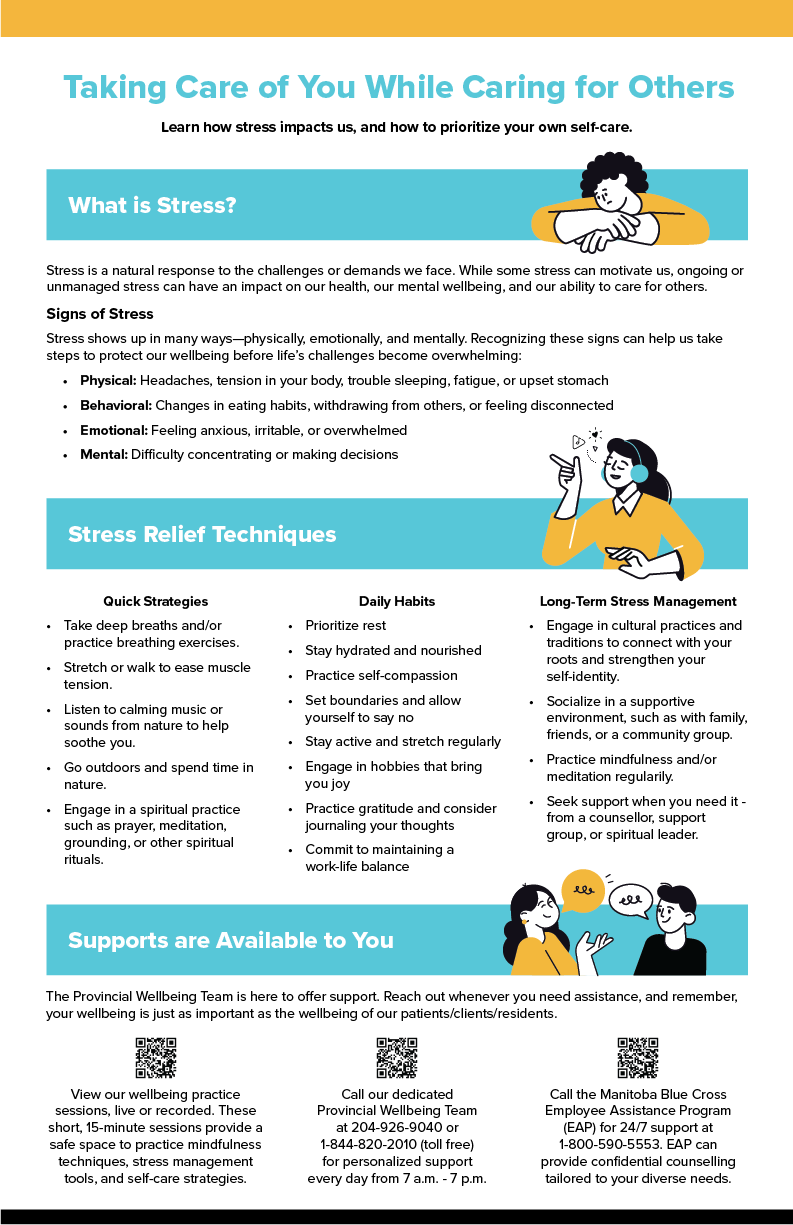Taking Care of You While Caring for Others
As healthcare workers across Manitoba, you work hard every day to care for others. Learn how stress impacts us, and how to prioritize your own self-care.
What is Stress?
Stress is a natural response to the challenges or demands we face. While some stress can motivate us, ongoing or unmanaged stress can have an impact on our health, our mental wellbeing, and our ability to care for others.
Signs of Stress
Stress shows up in many ways—physically, emotionally, and mentally. Recognizing these signs can help us take steps to protect our wellbeing before life’s challenges become overwhelming:
- Physical: Headaches, tension in your body, trouble sleeping, fatigue, or upset stomach
- Behavioral: Changes in eating habits, withdrawing from others, or feeling disconnected
- Emotional: Feeling anxious, irritable, or overwhelmed
- Mental: Difficulty concentrating or making decisions
Stress Relief Techniques
Quick Strategies
- Take deep breaths – In many cultures, breathing exercises, such as pranayama (yogic breathing) or deep belly breathing, can help reduce anxiety and calm your body.
- Stretch or walk – Traditional forms of movement such as tai chi, yoga, or simply going for a short walk, can ease muscle tension.
- Listen to calming music—Music is often used as therapy. Whether it’s traditional music, spiritual chants, or calming sounds from nature, let it soothe you.
- Spend time outdoors and connect with nature—Spending time in nature can significantly lower stress levels, , boost creativity and focus, foster calm and presence, and improve sleep, sense of connection, and mental and physical health.
- Engage in a spiritual practice— Prayer, meditation, or other spiritual rituals can provide peace, grounding, and emotional resilience.
Daily Habits
- Prioritize Rest – Getting enough sleep is vital. In many Indigenous and cultural traditions, rest is seen as part of the healing process.
- Stay hydrated and nourished – Eating balanced meals, including traditional, comforting foods that nourish both body and spirit, can be grounding.
- Practice self-compassion – Speak kindly to yourself, and remember it’s okay to take breaks and ask for help. In many cultures, community support is vital, so lean on your trusted networks.
- Set boundaries – Respecting your own limits is important in both professional and personal spaces. Saying “no” when needed is an act of self-care.
- Stay active and stretch regularly – Regular physical activity is a proven mood booster.
- Engage in hobbies that bring you joy – Some examples may include playing games, watching a movie, exercising, baking, or even taking a nap.
- Practice gratitude and consider journaling your thoughts to improve your mental health and even boost your immune system.
- Commit to maintaining a work-life balance – Take time to be present and turn off your notifications outside of work.
Long-Term Stress Management
- Make time for your culture – Engage in cultural practices and traditions that bring you joy and remind you of your roots. Whether it’s cooking traditional meals, participating in a community gathering, or connecting with elders, cultural connection is a powerful stress reliever.
- Socialize in a supportive environment – Whether it’s with family, friends, or a community group, staying connected with those who share your values can provide a sense of belonging and reduce stress.
- Practice mindfulness or meditation – In many traditions, practices like mindfulness, zen, or guided meditations are key to reducing stress and enhancing focus.
- Seek Support When Needed – It’s important to reach out for help, whether from a counsellor, support group, or spiritual leader.
Supports are Available for You
The Provincial Wellbeing Team is here to offer support. Reach out whenever you need assistance, and remember, your wellbeing is just as important as the wellbeing of our patients/clients/residents.
- Wellbeing drop-in practice sessions – View our wellbeing practice sessions, live or recorded. These short, 15-minute sessions provide a safe space to practice mindfulness techniques, stress management tools, and self-care strategies.
- Visit the Provincial Wellbeing Hub
- Call our dedicated Provincial Wellbeing Team at 204-926-9040 or 1-844-820-2010 (toll free) for personalized support every day from 7 a.m. – 7 p.m.
- Employee Assistance Programs (EAPs) – Call the Manitoba Blue Cross Employee Assistance Program (EAP) for 24/7 support at 1-800-590-5553. EAP can provide confidential counselling tailored to your diverse needs.

